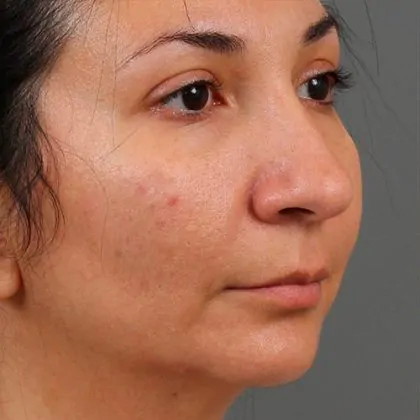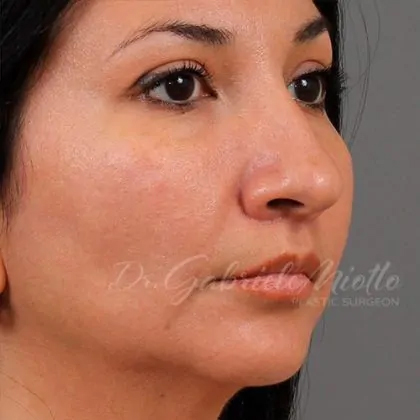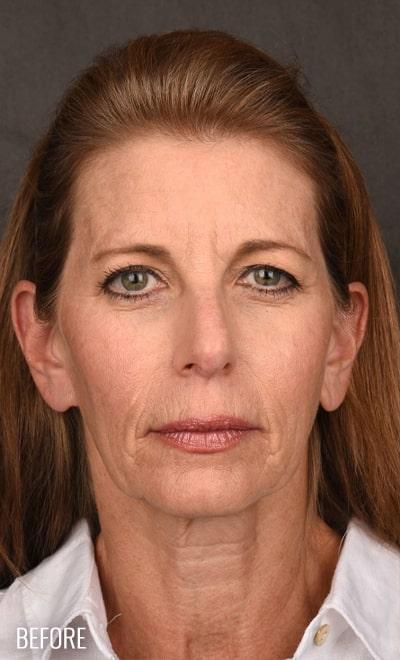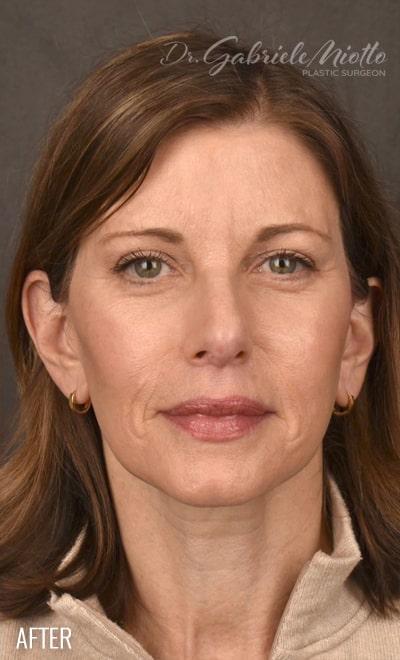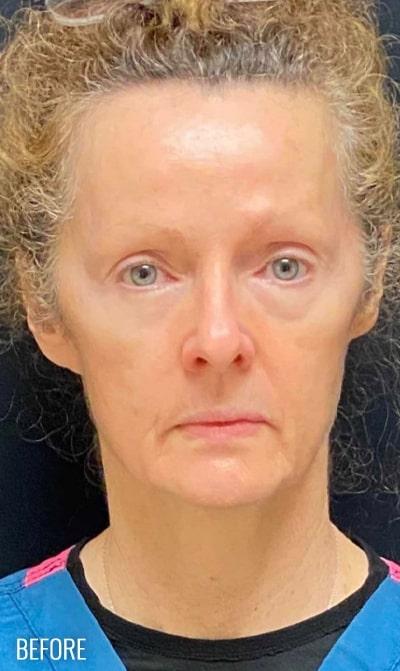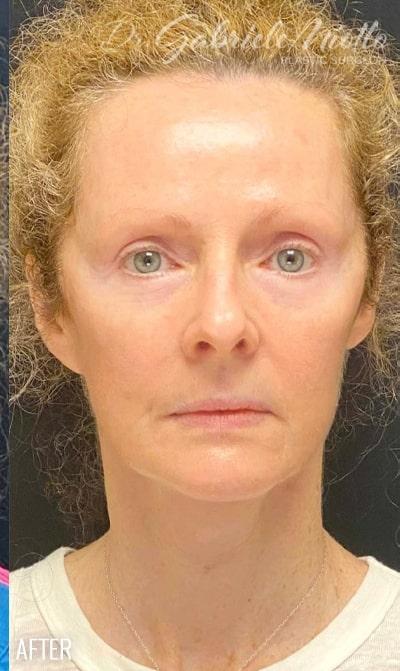Facelift
Conveniently located to serve the areas of Atlanta, GA

A facelift is a surgical procedure designed to reshape and reposition the facial tissues to restore a more youthful and refreshed appearance of the face. There are multiple ways this procedure can be performed, but Dr Miotto performs a facelift using the extended deep plane facelift, or deep plane facelift. This is a modern facelift, a surgery that does not distort the face, making it look natural and revitalized.
Dr. Gabriele C. Miotto is a plastic surgeon dedicated to facial aesthetics and medical director of ME Plastic Surgery. She is a renowned aesthetic surgeon and leader in her industry for her stunning natural results, attention to detail, and personable approach. She has been recognized multiple times among the top 10% of doctors at Emory Healthcare, in addition to being named one of America’s Best Plastic Surgeons by Newsweek for consecutive years.
To schedule your personal consultation with Dr. Miotto, please call our Atlanta office at (404) 850-5851 or contact us online.
Contents
Before and After Photos
About Facelifts
As we age, our facial skin and musculoaponeurotic system start to lose elasticity, causing the appearance of a drooping or sagging face. Dr. Miotto can perform the modern deep plane facelift and deep plane mini-facelift to help patients restore their facial youthfulness.
The Modern Facelift
The modern facelift addresses the entire midface, lower face, and neck to achieve a more cohesive and normal-looking appearance. This procedure targets both the skin and the underlying superficial muscular aponeurotic system (SMAS) to create normalcy, beauty, and longer-lasting results. (1)
Mini-Facelifts
A mini-facelift is a variation of the modern facelift that is designed for milder to moderate signs of facial aging. The mini-facelift does not treat the neck, just the face. This procedure requires less recovery compared to other versions of the facelift and uses smaller incisions. This variation offers a more subtle result and is ideal for younger patients who are starting to see jowls and facial laxity. (2)
Endoscopic Midface Lift
The endoscopic midface lift is a version of the deep plane facelift that is designed to address the upper face only and the cheeks. (2) This procedure is ideal for patients who would like to address heavy-looking cheeks, drooping skin, and it can also address the droopy brows as an extension of the endoscopic brow lift. This variation is ideal for those with less laxity around the jawline, as this procedure does not typically address the lower face or neck. (3)
Benefits of Facelifts
There are many benefits that patients may experience after receiving a facelift. These benefits may include:
- Youthful Appearance: A facelift can help patients achieve a more youthful appearance by tightening loose and sagging skin.
- Improved Shape: A facelift procedure can help patients enhance their jawline and cheekbones, creating more youthful-looking and shaped facial contours.
- Long-Lasting Results: The results of a facelift are long-lasting, with patients seeing effects last for up to a decade.
- Enhanced Confidence: Most patients who undergo a facelift or midface lift experience an improvement in their self-esteem and self-perception.
- Customizable Treatment: Dr. Miotto crafts each treatment to address the needs and concerns of each patient. She can also combine multiple treatments during a facelift for more comprehensive results.
To learn more about how a facelift or midface lift may benefit you, please schedule a personal consultation by calling our Atlanta office at (404) 850-5851 or contacting us online.
Ideal Candidates
Ideal candidates for a facelift include those who have developed visual signs of aging. Signs of aging may include sagging or drooping facial skin, as well as jowls, facial folds, deep creases, facial lines, and more.
All candidates interested in a facelift should be in good overall health, with realistic expectations as to what this procedure can achieve. Patients should also be free from any underlying medical conditions that may complicate healing. Patients should also be nonsmokers, or willing to quit several months before the procedure, fully refraining from use until fully healed (Dr Miotto does not operate on smokers). (1)
To find out if you may be eligible for our other procedures, please read Dr. Miotto’s blog!
Personal Consultation
Each patient is evaluated by a personal consultation with Dr. Miotto before scheduling their facelift procedure. This meeting is designed for our team to not only get to know each patient on a more personal level but also to help us find the best way to help them achieve their goals. It includes collecting information on their medical history, ideal treatment outcome, and any concerns.
We craft each patient’s facelift procedure, customizing it to each patient and their concerns. Preparation and recovery instructions will also be provided to each patient along with an all-inclusive cost estimate.
To schedule your personal consultation with Dr. Miotto, please call (404) 850-5851 or contact us online.
Preparation

Dr. Miotto will provide each patient with a set of personalized preparation instructions so that they understand how to prepare for their facelift. Patients are instructed to refrain from the use of certain medications or supplements, especially those containing blood-thinning properties. Excessive sun exposure, as well as the use of tanning beds, should also be avoided. (1)
Logistically, patients will need to pre-arrange transportation to the surgery center and home after the procedure, as well as time away from work and other social commitments, so that they can focus on healing.
Recovery
Each patient will receive a set of recovery guidelines at their personal consultation. Patients should ensure they follow the guidelines provided to them by Dr. Miotto and her team to facilitate a smooth recovery and the best outcome.
Swelling and bruising are commonly experienced in the face and neck, but these effects will gradually dissipate as healing happens. The postop period is managed under the direction and guidance of Dr. Miotto. Physical activity and other intensive activities should be avoided for 2-3 weeks. Sun protection should be prioritized while there is visible bruising and swelling. Dr. Miotto will schedule several follow-up visits so she can monitor the healing progress.
Results
The goals are beautiful and natural differences after surgery, and the full effects of a facelift will be very apparent between 3-6 months after surgery. (4) Patients will be able to experience a lifted, brighter look, a refreshed appearance without any “pulled look.” The face looks youthful in appearance, as the drooping and excess laxity and facial folds are reduced. Patients will also be able to see a more sculpted jawline after the lower face sagging skin is treated. The results of each facelift are long-lasting, with effects lasting between 5-10 years. (1) Patients can extend their results with the adoption of healthy lifestyle habits, skin health treatments, medical skin care, and daily use of sun protection.
The Cost of a Facelift in Atlanta, Georgia
The cost of each patient’s facelift will vary depending on several factors, such as the surgical techniques used and whether any additional procedures are performed. Dr. Miotto will provide each patient with an all-inclusive cost at their personal consultation after their customized treatment plan has been established.
ME Plastic Surgery is also proud to be partnered with Care Credit to offer financing plans for qualifying patients.
To receive the full cost of your facelift, please schedule a personal consultation by calling our Atlanta office at (404) 850-5851 or contacting us online, and a member of our team will be happy to help.
FAQ
While there is no best or specific age for a facelift, most patients receiving this treatment are those between the ages of 48 and 67 with signs of facial aging. (5)
There are always scars after any surgery, but incisions are placed in hidden areas such as around the ear, in creases, in the scalp, and along the hairline. The vast majority of scars are barely noticeable after complete healing.
Most patients are able to return to work within 2 weeks, but the exact timing will vary depending on the nature of each patient’s anatomy and surgical procedure. Dr. Miotto will give a more exact timeline during each patient’s consultation.
The results of a facelift are long-lasting, with most patients experiencing results for 5-10 years.
Yes, a facelift can be combined with another procedure for more comprehensive results. If you are interested in complementing your facelift with eyelid surgery, fat grafting, brow lift, or lip lift, Dr Miotto can discuss this in more detail during your consultation.
References
- Yang AJ, Hohman MH. Rhytidectomy. PubMed. Published 2021. https://www.ncbi.nlm.nih.gov/books/NBK564338/
- Park DM. Total Facelift: Forehead Lift, Midface Lift, and Neck Lift. Archives of Plastic Surgery. 2015;42(2):111. doi:https://doi.org/10.5999/aps.2015.42.2.111
- Quatela VC, Antunes MB. Transtemporal midface lifting to blend the lower eyelid-cheek junction. Clinics in plastic surgery. 2015;42(1):103-114. doi:https://doi.org/10.1016/j.cps.2014.08.003
- American Society of Plastic Surgeons ® Endorsed Partner.; 2023. https://www.plasticsurgery.org/documents/news/statistics/2023/plastic-surgery-statistics-report-2023.pdf
- Meretsky CR, Hausner P, Flynn BP, Schiuma AT. A Systematic Review and Comparative Analysis of Reconstructive Rhytidectomy: Advantages, Disadvantages, and Patient Outcomes. Cureus. Published online October 7, 2024. doi:https://doi.org/10.7759/cureus.71006


